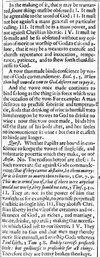Nicholas Perella
Puritan Board Freshman
[I am sorry moderators if this is not the correct forum to post this thread]
I have somebody specifically in mind who is a member of a PC(USA). What I am specifically going to ask about easily would fit for a member of a Roman Catholic Church as well, which has also come to my conversations from time to time.
I am wondering at what point(s) might membership vows conflict with ones conscience in regards to God and His Word. I know all churches are not perfect, but it seems to me, which is little since I did not attend church for most of my life, that Confessional churches though in practice may differ there is still an accord in the membership vows to allow for a Christian to find no conflict of conscience between their vows and God's Word. In other words, when might the honoring of membership vows and all the attachments that a Church may add to their constitution or statements over the years come into conflict? Do not membership vows declare that the church member adheres to all that the church may confess? When might privy thoughts matter no more because the public confession in the membership vows really state what a member believes?
Since this is understandably a case by case basis in approach, I am going to use the following conversation template to point out what I am driving at specifically as follows:
Person A: I think it is wrong that our church holds Doctrine Z.
Person B: You are a member of that church so your vows support Doctrine Z.
Person A: My vows, though to the church, are first and foremost vows to God, so yes, my church adheres to Doctrine Z but that does not mean that I adhere to Doctrine Z.
Person B: Your church membership vows mean you do adhere to Doctrine Z because that is what your church confesses and your vows are still with the church unless you are not honoring your church membership vows.
Person A: As I said, I do not have to believe everything in our church in order to remain honorable to my membership vows because God's covenant with me trumps church membership Doctrines and vows.
In what way might this scenario be true, not true, in part or whole?
Maybe there is a case to made that somebody could hold to doctrines completely opposite to the church doctrines and as long as church disciple allows the person to remain in the church that person could stay within that church. Yet, could a person truly say they are upholding membership vows and to use the example above that though they say they do not believe in Doctrine Z their membership vows do declare they hold to Doctrine Z no matter what they might privately think?
Thank You.
Any links to previous threads, articles, books, or any other valid postulating on the subject will be gratefully welcomed!
I have somebody specifically in mind who is a member of a PC(USA). What I am specifically going to ask about easily would fit for a member of a Roman Catholic Church as well, which has also come to my conversations from time to time.
I am wondering at what point(s) might membership vows conflict with ones conscience in regards to God and His Word. I know all churches are not perfect, but it seems to me, which is little since I did not attend church for most of my life, that Confessional churches though in practice may differ there is still an accord in the membership vows to allow for a Christian to find no conflict of conscience between their vows and God's Word. In other words, when might the honoring of membership vows and all the attachments that a Church may add to their constitution or statements over the years come into conflict? Do not membership vows declare that the church member adheres to all that the church may confess? When might privy thoughts matter no more because the public confession in the membership vows really state what a member believes?
Since this is understandably a case by case basis in approach, I am going to use the following conversation template to point out what I am driving at specifically as follows:
Person A: I think it is wrong that our church holds Doctrine Z.
Person B: You are a member of that church so your vows support Doctrine Z.
Person A: My vows, though to the church, are first and foremost vows to God, so yes, my church adheres to Doctrine Z but that does not mean that I adhere to Doctrine Z.
Person B: Your church membership vows mean you do adhere to Doctrine Z because that is what your church confesses and your vows are still with the church unless you are not honoring your church membership vows.
Person A: As I said, I do not have to believe everything in our church in order to remain honorable to my membership vows because God's covenant with me trumps church membership Doctrines and vows.
In what way might this scenario be true, not true, in part or whole?
Maybe there is a case to made that somebody could hold to doctrines completely opposite to the church doctrines and as long as church disciple allows the person to remain in the church that person could stay within that church. Yet, could a person truly say they are upholding membership vows and to use the example above that though they say they do not believe in Doctrine Z their membership vows do declare they hold to Doctrine Z no matter what they might privately think?
Thank You.
Any links to previous threads, articles, books, or any other valid postulating on the subject will be gratefully welcomed!


